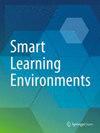在线自评元认知策略配合书面语言对培养伊朗雅思考生听力理解能力的影响
IF 12.1
Q1 EDUCATION & EDUCATIONAL RESEARCH
引用次数: 0
摘要
使用自我评估元认知策略可以提高英语学习者在面对面课堂上的学习成绩。然而,由于新技术的发展,在线课程变得越来越普遍,它对英语学习者在在线课程中的成绩的影响在很大程度上仍未被探索。本研究旨在通过调查在线自我评估元认知策略(OSMLS)与书面语言对伊朗雅思考生听力理解(LC)的影响来填补这一空白。通过方便抽样的方法,共选出67名雅思考生,并使用雅思听力测试进行同质化。得分接近平均分的参与者(n = 44)被随机分配到CG组(n = 22)或EC组(n = 22)。EG接受了在线OSMLS培训,而CG没有。两组分别进行前测、后测和延迟后测。采用单因素方差分析对收集的数据进行分析。结果表明,实验组在LC后验和延迟后验上均优于CG。研究结果表明,在线OSMLS可以提高英语学习者的外语学习技能,并对在线环境下的英语教学具有启示意义。本文章由计算机程序翻译,如有差异,请以英文原文为准。
Impact of online self-assessing metacognitive strategies accompanied with written languaging on cultivating Iranian IELTS candidates’ listening comprehension
Abstract The use of self-assessing metacognitive strategies has been shown to enhance English as a foreign language (EFL) learners’ achievement in face-to-face classes. However, its impact on EFL learners’ achievement in online classes, which have become more prevalent due to the development of new technologies has remained largely unexplored. This study aimed to fill this gap by investigating the effects of online self-assessing metacognitive strategies (OSMLS) accompanied with written languaging on IELTS candidates’ listening comprehension (LC) in Iran. A total of 67 IELTS candidates were selected through a convenience sampling method and were homogenized using an IELTS listening test. The participants (n = 44) whose scores were around the mean score were randomly assigned to either a CG (n = 22) or an EC (n = 22). EG received online OSMLS training while the CG did not. Both groups took a pre-test, a post-test, and a delayed post-test of LC. A one-way ANCOVA was used to analyze the collected data. Results indicated that the experimental group outperformed CG on both the post-test and the delayed post-test of LC. The findings suggest that online OSMLS can improve EFL learners’ LC skills and have implications for EFL instruction in online settings.
求助全文
通过发布文献求助,成功后即可免费获取论文全文。
去求助
来源期刊

Smart Learning Environments
Social Sciences-Education
CiteScore
13.20
自引率
2.10%
发文量
29
审稿时长
19 weeks
 求助内容:
求助内容: 应助结果提醒方式:
应助结果提醒方式:


